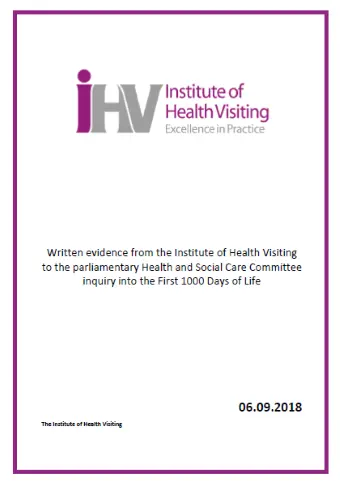Today, the government has published the Command paper which sets out the government’s response to the Health and Social Care Select Committee report on ‘First 1000 days of life’, published by the House of Commons in February 2019.
The iHV supported the recommendations set out in the Health and Social Care Select Committee’s report ‘First 1000 days of life’, which makes a clear case for early intervention and a strengthened national strategy for the first years of life. The government’s response today and renewed commitment to ensure every child has the best start in life is welcomed – although today’s response is, in many ways, a holding response as we await the results of the Spending Review, the publication of the Prevention Green Paper and Inter-Ministerial group on early years (Leadsom Taskforce) which will hopefully fill the many gaps in detail.
Today’s response recycles a number of existing policy commitments to improve maternity services, support Troubled Families and address the inequalities in early language. In particular, we welcome the renewed commitment to the ambitions of the Maternity Transformation Programme “for maternity services across England to become safer, more personalised, kinder, professional and more family friendly; where every woman has access to information to enable her to make decisions about her care; and where she and her baby can access support that is centred on their individual needs and circumstances.” It also calls for all staff to be supported to deliver care which is women-centred, working in high performing teams, in organisations which are well led and in cultures which promote innovation, continuous learning, and breakdown organisational and professional boundaries. We would welcome a similar ambition for health visiting services.
We are concerned that there is a notable absence of new policies for children and families once discharged from maternity services and limited national levers to reverse the current unwarranted variation in the quality and quantity of support that families receive based on where they live, rather than their level of need.
Ultimately the success of any programme will rest on sufficient resources being allocated nationally through a cross-departmental plan, and the Spending Review funding settlement for local government will have an important impact on whether wider improvements in population health and prevention can be delivered. We will continue to advocate for a strengthened health visiting service as set out in our recent letter to the Treasury.




